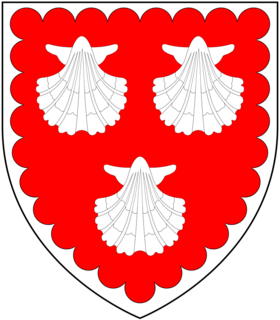Related Research Articles

George Monck, 1st Duke of Albemarle JP KG PC was an English soldier, who fought on both sides during the Wars of the Three Kingdoms. A prominent military figure under the Commonwealth, his support was crucial to the Restoration of Charles II in 1660, who rewarded him with the title Duke of Albemarle and other senior positions.
Sir Sackville Trevor was a Welsh sea captain and politician who sat in the House of Commons in 1625.
Sir Philip Stapleton of Wighill and of Warter-on-the-Wolds, Yorkshire was an English Member of Parliament, a supporter of the Parliamentary cause during the English Civil War. His surname is also sometimes spelt Stapylton or Stapilton.

Edward Cecil, 1st Viscount Wimbledon was an English military commander and a politician who sat in the House of Commons at various times between 1601 and 1624.
James Philipps was a Welsh politician who sat in the House of Commons between 1653 and 1662. He was a supporter of the Parliamentary cause during the English Civil War.

Sir Anthony Hungerford (1567–1627) of Black Bourton in Oxfordshire, Deputy Lieutenant of Wiltshire until 1624, was a member of parliament and a religious controversialist.

Sir Walter Erle or Earle was an English landowner and politician who sat in the House of Commons at various times between 1614 and 1648. He was a vigorous opponent of King Charles I in the Parliamentary cause both before and during the English Civil War.

Richard Herbert, 2nd Baron Herbert of Chirbury was an Anglo-Welsh Member of Parliament, a Royalist who fought with the rank of colonel in the English Civil War, and a peer whose membership of the House of Lords was curtailed by its abolition in 1649.

Richard Lovelace, 1st Baron Lovelace of Hurley, Berkshire was an English politician who sat in the House of Commons at various times between 1601 and 1622. He was raised to the peerage as Baron Lovelace in 1627.

Sir John Ratcliffe or Radcliffe was an English soldier and politician who sat in the House of Commons between 1614 and 1626. He was killed in action in France during the Siege of Saint-Martin-de-Ré.

Sir Gilbert Hoghton, 2nd Baronet was an English politician who sat in the House of Commons variously between 1614 and 1640. He was a Royalist leader during the English Civil War.

Sir Oliver Cromwell was an English landowner, lawyer and politician who sat in the House of Commons at various times between 1589 and 1625. He was the uncle of Oliver Cromwell, the Member of Parliament, general, and Lord Protector of England.

Sir Richard Leveson was an important Elizabethan Navy officer, politician and landowner. His origins were in the landed gentry of Shropshire and Staffordshire. A client and son-in-law of Charles Howard, 1st Earl of Nottingham, he became Vice-Admiral under him. He served twice as MP for Shropshire in the English parliament. He was ruined by the burden of debt built up by his father.
Sir John Leveson was an English politician. He was instrumental in putting down the Essex rebellion of 8 February 1601.
Sir Richard Ingoldsby, KB, of Lethenborough, Buckinghamshire, was the son of Sir Richard Ingoldsby of Lethenborough, the High Sheriff of Buckinghamshire in 1606, and of his first wife Elizabeth Palmer. She was the daughter of William Palmer, of Waddesdon, Buckingamshire and Joyce Pigott,.
Sir Hugh Owen Owen, 2nd Baronet, known as Hugh Owen Lord until 1809, was a British Liberal Party, Conservative Party and Tory politician.
Walter Tichborne (c.1580–1637) of Aldershot in Hampshire was MP for Petersfield from 1614 to 1621. He lived during the reigns of Henry VIII, Edward VI, Lady Jane Grey, Mary, and Elizabeth I.
Sir Henry Harington of Bagworth and Baltinglass, English and Irish landowner and soldier, known for his defeat at Arklow in 1599.
Philip Minor Cuney Sr. was a soldier, plantation owner and politician in Texas. He served in the House of Representatives of the Republic of Texas in 1843, and then in the Texas State Senate from 1846. His surname was originally spelled Cuny with the 'e' being added around the time he joined the legislature and his white descendants tended to use the original Cuny while Cuney was used by his black descendants. He owned the large Sunnyside Plantation south-east of Hempstead and owned over 100 slaves. By 1860 he owned 115 slaves making him one of the largest slave owner in Texas. He not only grew cotton like most plantations but also grew sweet potatoes and corn and later moving into dairy with 700 dairy cows.
Sir Henry Goodyer, also spelled Goodere and Goodier, was an English landowner and courtier, remembered today mainly for his close friendship with John Donne.
References
- "CUNY, Richard (-d.1627), of St. Florence, Pemb". History of Parliament Online. Retrieved 11 July 2013.